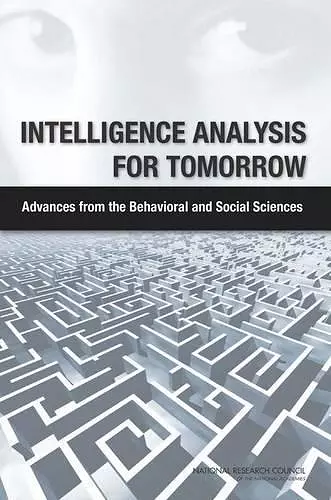Intelligence Analysis for Tomorrow
Advances from the Behavioral and Social Sciences
National Research Council author Division of Behavioral and Social Sciences and Education author Board on Behavioral, Cognitive, and Sensory Sciences author Committee on Behavioral and Social Science Research to Improve Intelligence Analysis for National Security author
Format:Paperback
Publisher:National Academies Press
Published:8th Apr '11
Currently unavailable, and unfortunately no date known when it will be back

The intelligence community (IC) plays an essential role in the national security of the United States. Decision makers rely on IC analyses and predictions to reduce uncertainty and to provide warnings about everything from international diplomatic relations to overseas conflicts. In today's complex and rapidly changing world, it is more important than ever that analytic products be accurate and timely. Recognizing that need, the IC has been actively seeking ways to improve its performance and expand its capabilities.
In 2008, the Office of the Director of National Intelligence (ODNI) asked the National Research Council (NRC) to establish a committee to synthesize and assess evidence from the behavioral and social sciences relevant to analytic methods and their potential application for the U.S. intelligence community. In Intelligence Analysis for Tomorrow: Advances from the Behavioral and Social Sciences, the NRC offers the Director of National Intelligence (DNI) recommendations to address many of the IC's challenges.
Intelligence Analysis for Tomorrow asserts that one of the most important things that the IC can learn from the behavioral and social sciences is how to characterize and evaluate its analytic assumptions, methods, technologies, and management practices. Behavioral and social scientific knowledge can help the IC to understand and improve all phases of the analytic cycle: how to recruit, select, train, and motivate analysts; how to master and deploy the most suitable analytic methods; how to organize the day-to-day work of analysts, as individuals and teams; and how to communicate with its customers.
The report makes five broad recommendations which offer practical ways to apply the behavioral and social sciences, which will bring the IC substantial immediate and longer-term benefits with modest costs and minimal disruption.
- Front Matter
- Executive Summary
- 1 Challenges for the Intelligence Community
- 2 Learning and Evaluation
- 3 Analysis
- 4 The Workforce
- 5 Collaboration
- 6 Communication
- 7 Conclusions and Recommendations
- Appendix A: Contents: Intelligence Analysis: Behavioral and Social Scientific Foundations
- Appendix B: Biographical Sketches of Committee Members and Staff <
ISBN: 9780309163422
Dimensions: unknown
Weight: unknown
116 pages